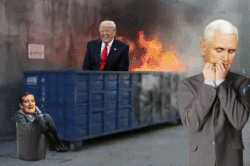Memes influence today’s public image of politicians

Gif courtesy of GIPHY.com.
January 30, 2018
The Internet took a massive hit with the tragic end of Vine in January last year. With that loss, a void emerged where six-second clips of politicians yelling, coughing, arguing- and everything in between- used to exist.
Though Vine ended, clips and memes of politicians flourished on Twitter and Instagram throughout the past two years.
The former Vine of Chris Christie saying, “off topic question, you have been stopped” during a press conference has over 250,000 views on YouTube. Months later, when photos of Christie relaxing on the beach became viral, Christie’s approval rating dropped to the lowest of any state senator in the past 20 years, according to a study done by Quinnipiac University.
Memes give Millennials, who outnumbered Baby Boomers last year, a platform to keep track of people in government.
In the past “meme-worthy” incidents, like former chair of the Democratic National Committee Howard Dean’s scream during the 2004 Iowa Democratic caucuses, have ended the careers of these men and women. However, these incidents seem to increase the knowledge and sometimes even the support citizens have for politicians.
During Trump’s term it seems that his every action creates a new meme, from throwing paper towels at hurricane victims in Puerto Rico to scandals with an adult film star.
Memes manipulate how the public views a politician. A looped video of Hillary Clinton coughing makes her look ill, while another gif makes her seem happy or sympathetic.
In 1976 Richard Dawkins first defined a meme as “a unit of imitation,” meaning as a meme goes viral, it shapes culture through mimicry. Memes spread misinformation quicker with humor because facts don’t make a meme go viral.
The personas of politicians we create through memes are ultimately what sticks with citizens when it comes time to vote. Today, when teens hear the Zodiac Killer, they are more likely to think of Ted Cruz rather than the late 60’s serial killer.
The Presidential Election of 2016 created the ultimate platform for teens and millennials alike to post the most memorable moments of the campaigns of Bernie Sanders, Hillary Clinton, and Donald Trump. The yelling matches during the debates inspired many meme creators. The idea of adults yelling over each other is funny enough alone, but the fact that the leaders of the country could not cooperate and listen to each other’s opinions is even funnier.
Memes also allowed the public to laugh at stressful moments without understanding the purpose of the event or speech. This obliviousness led to the support of a candidate based on their own misdirection.
Rather than imitating each other, all Internet users should research the policies of their favorite politicians than make memes of them.


